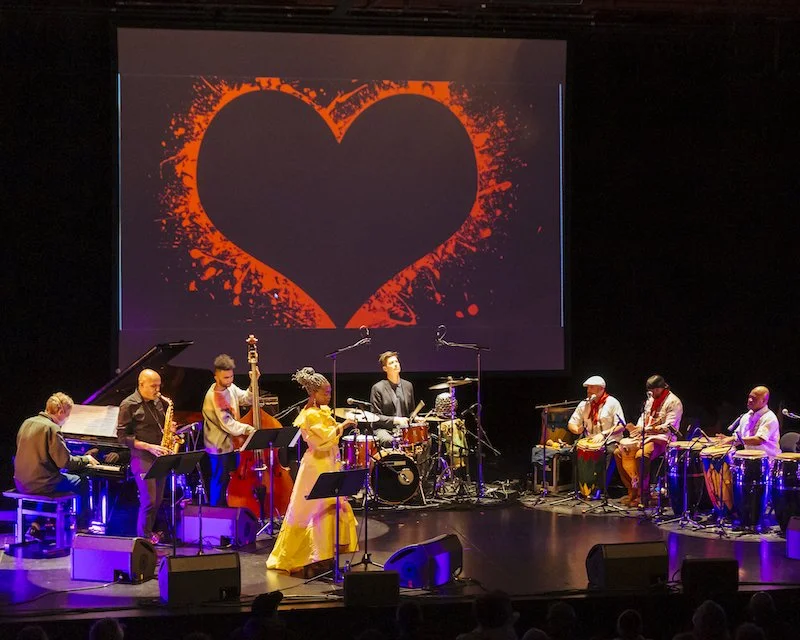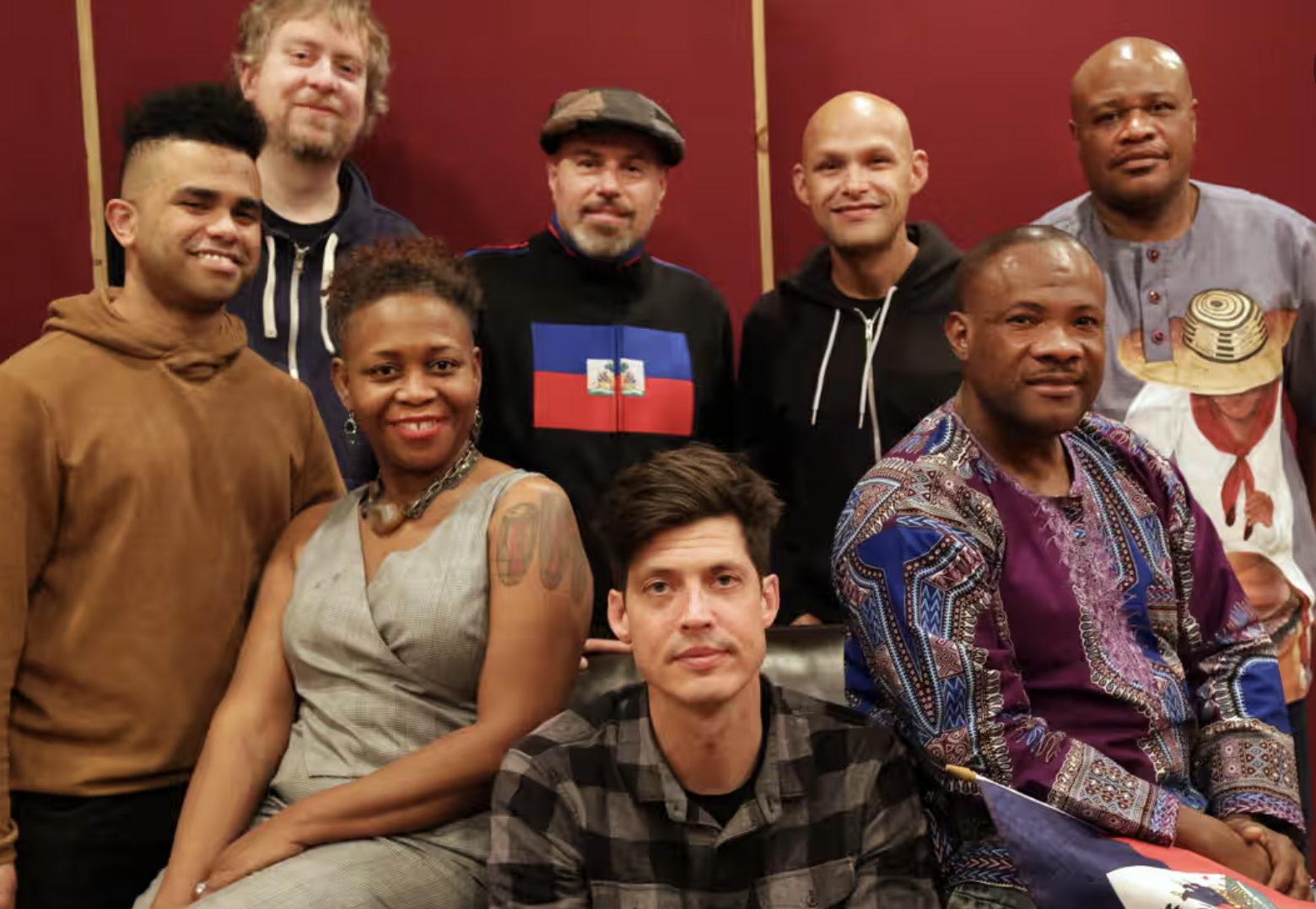Vodou spirits and two-headed serpents, as We All Break rides Haitian rhythms at Vancouver International Jazz Festival
Avant-garde percussionist Ches Smith and master drummer Daniel Brevil’s all-star ensemble blends jazz with the ancient and the modern, the Afrocentric and the Eurocentric
We All Break combines energy, virtuosity, surprise—and a little of the supernatural.
The Vancouver International Jazz Festival presents We All Break at Performance Works on June 29
WE DON’T GENERALLY give homework, but if you’re thinking of catching We All Break at the Vancouver International Jazz Festival, there’s something you might want to do first.
Your assignment, should you choose to accept it, is to head to Vimeo and watch Mimi Chakarova’s enlightening film about the making of the group’s debut LP, Path of Seven Colors. And if you’re not thinking of seeing We All Break when it plays Performance Works next week, watch the documentary anyway.
You might change your mind.
Some groups are best encountered cold, and if you don’t take our advice there’s little doubt that We All Break’s combination of energy, virtuosity, and surprise will win you over. But there’s also a lot going on with this all-star ensemble, the shared brainchild of avant-garde percussionist Ches Smith and Haitian master drummer Daniel Brevil. It is at once entirely unprecedented and a throwback to the earliest days of jazz, and while that might seem contradictory, we can explain.
But first, how did the band start?
For Smith, his interest in Haitian music dates back to his student days, long before his acclaimed work with John Zorn, Secret Chiefs 3, and many others. While attending Mills College in Oakland, California, he was asked to accompany Haitian choreographer Michelle Martin’s dance class, a task he accepted with some trepidation.
“Before the first day, I didn’t know anything about it,” he explains in a shared Zoom chat with Brevil. “I was a little panicked, and I showed up to the first class and said ‘I couldn’t find anything to listen to, and what should I do?’ And she was like ‘Well, you could play a 4/4 or a 6/8 rhythm to start with, and then if you want there’s other drummers that know about the tradition and have studied it extensively that are playing for my other class.’ So in my off hours I was going to her other class and those drummers just started me on bells, or the third drum part—things like that.”
Brevil, in contrast, grew up with Haitian drumming—and with the culture that its complex rhythms help animate. His father was not only a master drummer; he was also a vodou priest, an adept in the religion that we more commonly think of as voodoo. A full description of vodou is beyond our scope here, but essentially it’s a syncretic faith that melds West African animism with an overlay of Roman Catholic ritual. The African elements predominate, though, along with the belief that the miraculous exists in our everyday world, and that a variety of gods and goddesses—or loa, in Haitian Creole—can be summoned by prayer, dancing, and drumming.
We All Break, with Ches Smith (bottom centre) and Daniel Brevil (bottom right).
Brevil himself was introduced to the supernatural early on in life, an encounter he addresses in the song “Here’s the Light”. “That is a song about my experience when I was growing up—my connection with the spirits,” he explains. “I remember there was a time—I was a little boy—when I lay down and I felt there was something underneath my sleeping mat. I just lifted it up and I saw a little snake with two heads. I was kind of afraid, but my dad was around and he said ‘Do not do anything with it, and just be lucky. You lay on him and he didn’t do anything? He just wants to make you feel like you’re secure. If somebody is around you, don’t be afraid… Know that somebody is there for you, okay?’ I didn’t know what that meant, but my dad was a priest, and he just grabbed it and went to the yard and he let it go.
“Since that,” he adds, “I’ve felt a connection to the spirit of Damballa. And once you know you have that protection, you have to give back to that protection to make sure you’re still secure. You’re not going to have a bodyguard around if you’re not paying him. You have to give something back to the bodyguard, so that song is just to acknowledge the spirit of Damballa.”
The most powerful of the loa, Damballa often manifests in serpent form. A variety of other spirits are invoked in We All Break’s songs, whether traditional or co-composed by Brevil and Smith, and while the intent is to provide a transporting musical experience rather than mirror a vodou ceremony, the loa can appear nonetheless. “What we are playing, especially the drumming, is just like it would happen in a ceremony or a dance performance, the traditional rhythms,” Smith says. “They do have that function, to bring the spirits, and we’re welcoming that. But most of my experience with the spirits has been in the context of ceremony—although there was a rehearsal with this band, a long time ago, when a singer actually did catch a spirit in the room and that person became possessed.”
“It is going to seem strange,” Brevil adds when asked how the music might affect people who have not grown up with Haitian tradition, “but once the person is in the room, the person expects things like that to come. And when it does come, that person might feel strange and not know what’s going on, but it’s not really a situation to be afraid of, or scared that things are going to happen to that person. In a positive way, you’re just like ‘Oh, wow, that’s what it is? Alright!’ And then you start to really get yourself into what is going on. Sometimes people don’t even know what a loa is, but when you’re in the moment and the loa is on somebody, happening, then you’re probably going to think ‘Oh, I thought it [vodou] was something bad, but that’s not what I’m seeing. You know what? I need to know more about this.’”
Beyond the possibility of the uncanny, there are other reasons to explore We All Break’s music. The band is a rare example of cross-cultural fusion in which all of the elements—the folkloric and the avant-garde, the ancient and the modern, the Afrocentric and the Eurocentric—are fully integrated, with the ensemble’s Haitian members taking the lead. “I don’t know if he’s joking, but Daniel is always going ‘You’re the boss, Ches!’” Smith says, with Brevil nodding in assent. “But, really, he’s the boss. We all listen to Daniel in the group. He almost acts as our musical director.”
At the same time, the band also includes some key members of the New York City avant-jazz scene, including the wildly gifted pianist Matt Mitchell, rock-solid bassist Nick Dunston, and, for this tour, longtime Vancouver favourite Tim Berne on alto sax. Strangely, however, the modernists all contribute to a sense that We All Break is as rooted in the jazz past as it is in Haitian tradition: listening to Path of Seven Colors, I’m continually reminded of Jelly Roll Morton’s pioneering New Orleans gumbo, the Caribbean explorations of Dizzy Gillespie and Charlie Parker with Cuban drummer Chano Pozo, and John Coltrane’s embracing of West African rhythms during the early 1960s.
For one member of the creative team, that’s entirely intentional. “All the things you mentioned, I was aware of as we started this band,” Smith confirms—although for his musical partner there’s been another, unexpected side effect. “I was not a fan of jazz before,” Brevil says, “but Ches made me become one.”
Could there be a better band for the Vancouver International Jazz Festival’s penultimate night? ![]()















